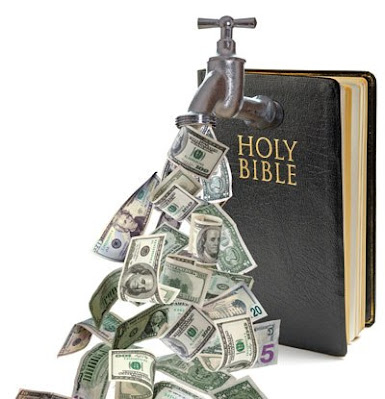THE GOSPEL AND MONEY OR THE GOSPEL FOR MONEY.
July 11, 2021
Fifteenth Sunday in Ordinary Time – B.
A Sicilian proverb says: “The prior said to the abbess:
without money no Mass will be sung.” And a Kurdish proverb adds: “When the
money starts to glitter and clink, even a Mullah will leave the mosque.”
Is the announcement of the Gospel opposed to material
possession, especially money? Put in that way, this question could sound
simplicist and even provoking. But it is the aim of the Gospel of Christ to
provoke and call to action. The main issue here is the relation between the
announcement of the Gospel and money.
To see the way many men and women of God live today, the
temptation is great to say that they have become evangelists, pastors,
preachers, prophets, priests, or bishops only for money. For, someone said, it
pays well it seems, that work of 'man of God'. But, the real question, ‘Are we
prophets and preachers for money or for the sake of human salvation?’
I happened to read an analysis on the famous ‘Prosperity
Theology’. The article was titled, “The Prosperity Gospel: A Global Epidemic.”
The author started with this insightful observation: “Prosperity is a hot topic
in the church. Does God care if a pastor drives a nice car or lives in a nice
home? Does God command that all who follow Him take a vow of poverty and starve
their families in a protest of earthly comfort?” Ending his opening remarks, he
says, “the prosperity gospel is placed front and center as one of the deadliest
teachings in the world today. It has attached itself to the Bible, and to Jesus
Christ—though it has no business doing so. Countless people in third-world
countries chase after it in search of stability and hope. Yet, all those who
live and die trusting in the prosperity gospel for salvation will be left
wanting in both this life, and the next.” And he said, the prosperity gospel is
not a “good news”, for the simple fact that it transforms the Good News of
Christ into an income-generating business which real beneficiaries are not
those to whom it is preached but rather those who preach it. Pastors and
preachers get rich and richer while their innocent and compliant flock get
spoliated of their little and reduced to the saddest moral, intellectual,
financial, and spiritual poverty.
Today’s first reading will help us reflect on that question.
Amos faces opposition from the people and the leaders. His oracles set them
uneasy. He preaches against the Temple, the practices of the priests, and the
king. In today's extract, the Priest Amaziah, a priest relishing the favors of the
king confronts Amos and urges him to flee from Bethel. “Off with you,
visionary, flee to the land of Judah!” With the main argument that, there, he
could not only have his life saved but also, and principally earn his bread by
prophesying.
Then, our principal question finds its ground, why are we
prophesying? Is it to earn our bread or rather earn people for God? The answer
of Amos comes right away, “I was not prophet, nor have I belonged to a company
of prophets; I was a shepherd and a dresser of sycamores. The Lord took me from
following the flock, and said to me, Go, prophesy to my people Israel.” We are
chosen and sent by God to speak to his people on his behalf, and not to make
money for ourselves. One who finds the origin of his prophecy in God does not
fear human authorities who try to silence him. Only ‘belly-prophets’ fear to
oppose the truth of God to the wrongs of this world. Their preaching is all
about worldliness and prosperity and that is what sustains their lives.
In the Gospel, the Lord Jesus, sending the twelve for their
first apostolic endeavor gives a firm instruction: “take nothing for the
journey but a walking stick—no food, no sack, no money in their belts. They
were, however, to wear sandals but not a second tunic.” It is in fact a call to
a stout trust in the providential care of God. In a synoptical passage, we
could read, “Stay in the same house and eat and drink what is offered to you,
for the laborer deserves his payment. Do not move about from one house to
another. Whatever town you enter and they welcome you, eat what is set before
you…” (Lk 10:7-8).
The preacher of the Gospel does not have to worry about what
he will take for his subsistence. God will always provide. For certain, as says
the Lord, the laborer deserves his payment, but the laborer should not make of
his payment the reason for his labor. The prophet or the preacher is chosen and
sent to orate the Good News of God to his people and not to work for his own
personal and selfish interests.
St. Paul in the second reading tells the Ephesians that God
“has blessed us in Christ with every spiritual blessing in the heavens, as he
chose us in him, before the foundation of the world, to be holy and without
blemish before him.” We are blessed, chosen, and sent. We are gifted to give
and not to receive. The priority, therefore, should be for us to give Christ
and his word of salvation. And then, if by giving we receive his providential
care, be happy and move on.





Comments
Post a Comment